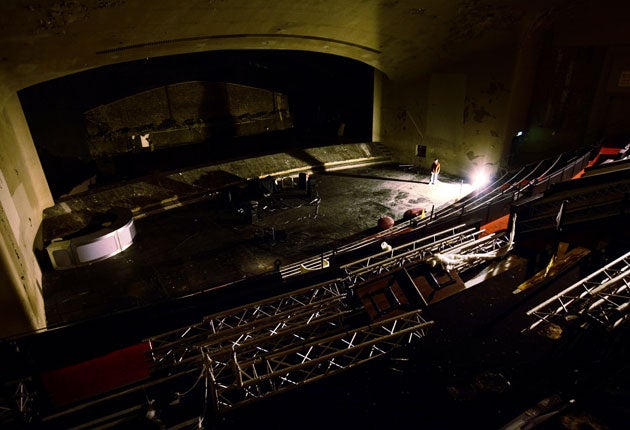Cinema's golden age reaches the final reel
They brought glamour into simple lives, but Britain's Art Deco picture palaces are being pulled down by developers with grand ideas

Your support helps us to tell the story
From reproductive rights to climate change to Big Tech, The Independent is on the ground when the story is developing. Whether it's investigating the financials of Elon Musk's pro-Trump PAC or producing our latest documentary, 'The A Word', which shines a light on the American women fighting for reproductive rights, we know how important it is to parse out the facts from the messaging.
At such a critical moment in US history, we need reporters on the ground. Your donation allows us to keep sending journalists to speak to both sides of the story.
The Independent is trusted by Americans across the entire political spectrum. And unlike many other quality news outlets, we choose not to lock Americans out of our reporting and analysis with paywalls. We believe quality journalism should be available to everyone, paid for by those who can afford it.
Your support makes all the difference.The bulldozers were hard at work last week in Lancaster, wreaking destruction on the 1936 Regal cinema in King Street. It was a classic example of Art Deco cinema design, but today all that is left of it is rubble.
More than 20 of Britain's 1930s cinemas could face a similar fate, as developers seek to strip out their interiors or raze them to the ground.
The ornate 1934 front of the Doncaster Odeon was turned to dust last month, to make way for a leisure complex, and the Newcastle Odeon – a 1931 former Paramount cinema – is now facing demolition after the Department for Culture, Media and Sport rejected a listing application.
Even the UK capital of cinema, Leicester Square in the heart of London, is not immune. The historic Odeon West End, which has dominated the corner of the square for more than 80 years, is facing a redesign that will relegate screens to the basement, to allow a hotel, flats and a restaurant to be built on upper storeys.
David Trevor-Jones, chairman of the Cinema Theatre Association, which campaigns to save the buildings, said: "We're losing swathes of and it's a tragedy. We live in a world of corporations and cheap architecture, but these buildings take you to another place. They're all about grandeur and supreme fantasy."
The association claims that the architectural significance of cinemas is overlooked because they are considered lowbrow. "I think cinemas are still undervalued; no town would willingly lose its Victorian theatre, but the same isn't the case for iconic cinema buildings," said Mr Trevor-Jones. "They're part of our social and cultural history, but they have no protection."
Many of the 22 buildings now at risk have not been functioning cinemas for years, but have been protected in their original state by accommodating bingo halls. Elain Harwood, a senior architectural investigator at English Heritage, says the demise of bingo has sounded the death knell for some of Britain's oldest cinema buildings.
"The bingo halls were the great saviour of old cinemas," she explained. "When a lot of the old cinema and theatre buildings closed in the late Fifties and early Sixties they were turned into bingo halls and therefore preserved. In the last two years, since the smoking ban, bingo has been in freefall and loads of cinema buildings are now out of use. Even those that are Grade II-star listed are under threat, because they have been empty for so long."
There are just under 200 listed cinemas in England, of which 26 have a Grade II listing that protects the whole building. This does not stop the threat of developers, however, if a building remains disused for some time. The only cinema with Grade I protection is the former Granada in Tooting, south London.
Under threat...
Odeon, Newcastle upon Tyne Faces the bulldozers after de-listing by the Department of Culture
The former Imperial, Crawley To be partly knocked down, making way for flats
Odeon, Doncaster Demolished last month to make way for new development
Odeon, Cheltenham Bought by a nightclub operator
Odeon West End, Leicester Square Cinema screens to be moved to basement so upper storeys can be redeveloped.
Whiteladies Picture House, Bristol Grade II listed, but now faces conversion to church or shops
New Olympia, Todmorden, Yorkshire Turned into a Kwik Save store, and now the whole building faces demolition for housing
Cineworld, Ealing Everything demolished apart from the façade, to make a bigger cinema
Torbay Cinema, Paignton Owned by rail station next door, which wants to turn it into a ticket hall
Odeon Orion, Cleveleys Just closed as a bingo hall and is not listed; now facing an uncertain future
State Cinema, Grays, Essex Closed and unused since 1991; now the owner wants to convert it to host conferences
Odeon, Lancaster Was a Gala bingo hall, but is now being bulldozed for a Travelodge hotel to be built on site
Odeon, Chester Proposals to turn it into a giant nightclub
ABC Streatham Interior has been replaced by flats, but now the façade too is at risk
Picturedrome, Sleaford Became a nightclub, which is now closed. Now under threat
Join our commenting forum
Join thought-provoking conversations, follow other Independent readers and see their replies
Comments